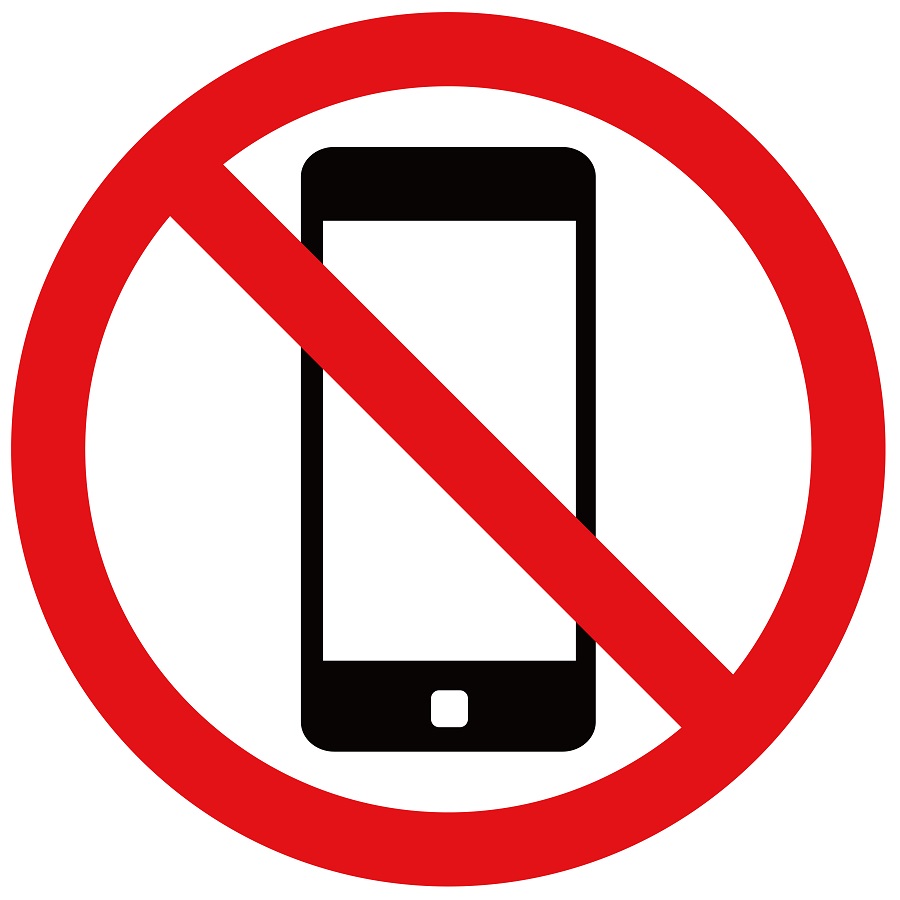Cell Phones in the Classroom
Smartphone prohibition mark.
Blackfoot High School (BHS) is recently hammering down on a cell phone policy that has been in place for some time in classrooms. If you are caught with your phone out in class, you will be asked to put it in a cell phone pouch somewhere in your classroom. Then, if you are caught with your phone out again, it will be confiscated and given to the office. The school did this because of potentially positive outcomes they see coming from this policy. For example, faculty believe by taking phones away, there will be less of a distraction and less chance of a student cheating. When making policy decisions, one must also look at what the negative outcomes of taking a student’s phone away could be? When is it wrong vs when is it justified?
Technology has changed societal norms forever. Thinking back twenty years or so ago when many faculty members would have been in their high school years, cell phones weren’t readily available. People delayed communication or relied on less technology to communicate. Now, everyone has adjusted to the use of cell phones and having them on them whenever they need them, thus making potentially everyone and anyone accessible instantly. Society has adjusted to the fact that nearly everybody they need to get a hold of also has a cell phone on them. Cell phones were created for the sole purpose of keeping people connected over long distances.
Cell phones in the classroom allow students to be in reach of anyone who needs to get ahold of them, for things such as a family or personal emergency. I got my first phone when I was ten years old, initially because my parents needed to be able to get a hold of me for the short period of time between when I got home from school and when they did. It was to make sure my brother and I got home safely and checked in using my phone. Cell phones advanced rapidly and things like tracking each other became a useful tool. As I have aged and taken on even more responsibilities, my parents often get a hold of me while I’m in class because they have questions that they need me to answer as soon as possible. At times the situation is reversed and I need to reach my parents and receive their advice or answers quickly as well. The argument that our parents (or anyone else) can call the office if they need to get a hold of us, is not an effective way to go about things. Some problems created by everyone going to the office to use phones or get messages from the office would be that it creates more work for the office. Are parents going to wait on hold while we take the students away from class? What if the phone line is busy and another family needs to reach the office or their student? We have somewhere in the neighborhood of 1200 students and 3 phone lines available for students. That is roughly 400 students for each line.
Another argument that faculty makes for enforcing the phone policy is that students do not need phones because they have access to iPads so working with the theory that all school time communication for students is done via the office and all internet usage will be channeled through school issued iPads. The iPads provided to the students at BHS block access to a lot of websites, some of this censorship, let’s call it what it is. When you restrict access to information, that is indeed censorship and much of this censorship is unreasonable. For example, a student may be doing research for an essay they are writing but cannot find any information on it because all of the websites the research is directing them to are blocked. One example is, Idaho State University’s Bengal Web was blocked at one point, and this is the platform used to do school work through ISU for dual credit students. With phones allowed in the classroom, you don’t have to worry about the blocked websites and can just look the information up on your phone, thus censoring your own information as to what you deem appropriate and necessary to perform your role as a student.
Many times we are asked to follow a school page on Instagram, Facebook, or some other platform some of which would be banned through BHS iPads. Frequently, teachers put us in groups and ask us to get our group members’ numbers so that we can stay in touch about the project we may be working on. This would limit collaboration on school projects and begs the question: is it fair to ask the student body to exchange numbers in order to do school work but not to have their cell phones out during class? One could safely argue that this is a little hypocritical. Along with that, teachers use Remind all of the time, either with the app or through text messages. Teachers ask you to sign up for Remind when you start the class and students sign up with their phones because you can’t get Remind as an app on the provided iPads. Clearly relying solely on the iPads would then render Remind useless during school hours, does that seem like an effective tool anymore?
Times are changing and technology is evolving and becoming as much a part of life as the air we breathe. Phone calendars have replaced day planners in helping students learn how to manage their time and projects to be successful both personally and academically. We use our cell phones more than we do our iPads, mostly because the iPads have limited and basic resources at best. Having phones in the classroom is helping with time management and organization in a student’s life.
Cell phones are a big part of our ever evolving society, they are used in the workplace, they are used in an individual’s social life, home life, for some it’s even a regular bathroom habit. In essence, cell phones are in every aspect of an individual’s life- so why shouldn’t they be allowed in the classroom? Instead of substituting a useful tool with an antiquated overly censored piece of equipment and creating more work for administration, why wouldn’t we find a way to peacefully coexist with the lifeblood of our modern technology. Perhaps we need to be asking if we are creating more problems with this policy through the collateral damage that will occur from frustrated parents, students and already extremely busy staff members.

Kailynn Miller, is a senior at Blackfoot High School. She has been in Newspaper for 3 years and her initial thoughts are that she enjoys it very much....










Jeremy Ullery • Feb 28, 2022 at 1:12 pm
Phones should not be taken by teachers.